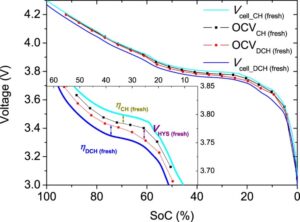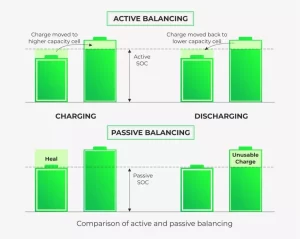Analyze the impact of voltage and capacity on lithium battery performance!
In lithium battery, the interplay between voltage and power is a crucial determinant of performance. In this guide, we will educate you on the importance of these two primary factors and their joint impact on baterías de litio‘ overall efficiency and life.
Effect of voltage on lithium battery function
Voltage is generally considered the voltage within a lithium battery and is an effective indicator of its charge. This section delves into the nuances of voltage dynamics and explores how changes in voltage affect the overall functionality and performance of lithium batteries. Beyond traditional understanding, it is essential to realize that voltage is the heartbeat of these energy storage systems, determining how quickly electrons flow and power is transferred. Voltage plays a crucial role in determining the energy output and operating characteristics of lithium batteries, from nominal voltage to charge and discharge cycles, and the complexity of voltage is essential for optimizing batteries in applications ranging from portable electronics to electric vehicles. important.
Effect of capacity on lithium battery function
Capacity is a key factor affecting the function and performance of lithium-ion batteries, determining their energy storage capabilities and overall utility. A battery’s capacity, measured in ampere-hours (Ah) or milliampere-hours (mAh), represents the total power the battery can store and deliver during a discharge cycle. Capacity directly affects the runtime and energy output of lithium-ion battery-powered equipment. Higher-capacity batteries provide longer use time between charges, making them ideal for applications with higher energy demands, such as electric vehicles, smartphones, and laptops. Conversely, smaller-capacity batteries are suitable for devices with lower power requirements. However, it is essential to note that capacity alone does not determine battery performance. Factors such as discharge rate, temperature, and depth of discharge also affect a battery’s efficiency.
Interdependence of Voltage and Capacity
The voltage and capacity of baterías de iones de litio exhibit complex interdependence, with voltage and power being closely related, affecting the battery’s overall energy storage and delivery capabilities. The voltage remains relatively constant during discharge until the battery’s cutoff voltage is reached, at which point the voltage drops sharply. This voltage behavior is critical in determining a battery’s compatibility with electronic devices since devices are designed to operate within a specific voltage range. The interplay between voltage and capacity becomes apparent in energy density, the amount of energy stored per unit volume or weight. Balancing these factors is critical to optimizing battery performance, given the specific requirements of applications ranging from small electronic devices to electric vehicles.
How to balance lithium battery voltage and capacity?
Balancing the voltage and capacity of a lithium-ion battery is crucial in optimizing its performance and lifespan. During the battery design process, engineers focus on selecting materials and cell configurations to produce the desired voltage profile while ensuring adequate capacity. This includes optimizing electrode materials, electrolyte formulations, and overall battery architecture. During the charging phase, adhering to the specified voltage limits is crucial. Overcharging can cause safety hazards, degrade battery component performance, and shorten battery life. An advanced BMS plays a key role by monitoring and controlling the charging process, ensuring that each cell in the battery pack receives a proper charge without exceeding voltage thresholds.
The role of voltage and capacity on lithium battery safety
Voltage and capacity play a vital role in ensuring the safety of lithium-ion batteries, and voltage management is critical for safety. Overcharging a lithium-ion battery beyond the specified voltage limit can cause thermal runaway. This phenomenon generates excessive heat that can cause the battery to rupture or catch fire. The BMS monitors and controls the charging process, preventing overvoltage conditions and catastrophic failures. Continuous operation of batteries under extreme conditions, whether at total capacity or deeply discharged, can lead to performance degradation, shortened lifespan, and safety risks. The BMS monitors capacity-related parameters to ensure the battery operates within a safe range, preventing over-discharge and potential damage.
Al final
We hope that by analyzing the impact of voltage and capacity on lithium battery performance, our users can better use and understand lithium batteries. Whether you are a skilled operator or a battery novice, this article is worth your reference. For more product-related information about lithium batteries, you can check it out on our official website.



